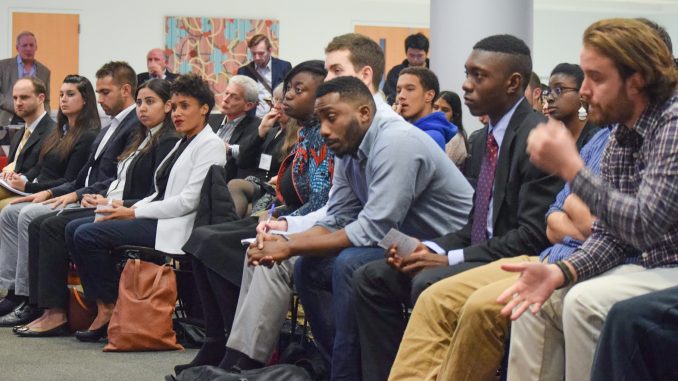
Sabrina Zouaghi’s mother has Parkinson’s disease, and her daughter wants to find a cure.
That’s why Zouaghi, a freshman biology major, came to Temple this semester from Algeria to study science. But she realized in her “Creativity and Organizational Innovation” class that the goal was out of her reach at the moment. Her professor encouraged her to do the next best thing: find a way to improve Parkinson’s patients’ quality of life.
Because a symptom of Parkinson’s disease is body tremors, Zouaghi pitched her idea of Self-Stabilizing Gloves at the Innovation and Entrepreneurship Institute’s 18th annual Innovative Idea Competition Nov. 11 at Alter Hall. She won a total of $1,000 from earning second place for the undergraduate award and second place for the people’s choice award.
“Because I wanted to find the solution, I was more serious—it wasn’t just about doing the homework,” Zouaghi said.
Set up like ABC’s “Shark Tank,” this year’s competition had 12 finalists pitch their business ideas to a panel of four judges, made up of angel investors and last year’s IIC grand prize winner Bethany Edwards, who founded her company Lia Diagnostics this past March. With two minutes to present and three minutes of Q&A from the judges, presenters pitched ideas ranging from a gaming-dating hybrid app to sustainable dyes made from plant material.
The competition, open to undergraduates, graduates, faculty and alumni, accepts submissions from all majors. With 351 submissions from 12 schools and colleges at Temple, the amount of submissions grew by 39 percent this year, said Ellen Weber, executive director of IEI.
“This is a really good entry place for someone who’s interested in learning about entrepreneurship but isn’t sure,” Weber said.

Much of this growth came from promotion on campus, with some gen-ed courses requiring students to participate in the competition.
“That’s what we’re trying to do, is have a bigger impact,” said Robert McNamee, managing director of IEI and assistant professor of entrepreneurship. “Gluing together the academic courses with competitions like this is, I think, a really great way to engage the students.”
Stephen Peduto, a freshman biomechanical engineering major, came up with Quick Stabilizing Carbon, a speedier solution to casts and splints for broken bones, as a class project with his partner. He decided to submit the idea to the competition on his phone in the middle of a class.
Peduto won the Anne Nelson Grand Prize of $2,500.
“We didn’t really realize the scope or the nature of the competition until we got that email saying we were finalists,” Peduto said.
Other competitors like Olawunmi Thomas-Quarcoo, a first-year MBA student, came back to school with the intention of becoming their own bosses. She said she appreciated the judges’ feedback on her pitch, Ka Bom Designs, an online marketplace for fashion designers combining African fashion with American styles, which won a total of $2,000. “Ka bom” means to join together in Twi, a language spoken in her family’s home country of Ghana.
“I always knew I wanted to do something to give back to my culture,” Thomas-Quarcoo said. “We decided that we wanted to use fashion to kind of shed light on Africa … and something that we loved: African fashion.”
Séverine Bandou, an innovation management and entrepreneurship graduate student, won $500 for her pitch, Myjé, a hair fragrance for women with textured hair that is often too difficult to wash regularly. Hailing from Paris, she used her eight years of experience in the cosmetics industry to come up with a solution for something she deals with herself.
“I need to create value for the customer,” Bandou said. “So it pushed me to pinpoint a real problem that [curly haired] girls have.”
As a judge, Zachary Thomson, vice president and managing director of Thomas Family Holdings, found an idea like Bandou’s to be the most effective.
“The trick is to make sure that you aren’t innovating just to innovate, but you’re innovating because you’ve identified a problem to solve, and most importantly, because it’s something you’re passionate about,” said Thomson, a 2011 alumnus.
Zouaghi, as well as many of the other competitors, plans to enter next semester’s Be Your Own Boss Bowl, a business plan competition where ideas will need to be more fleshed out. She wants to collaborate with a designer and engineer to build a prototype of her gloves, in hopes she can build a working device for Parkinson’s patients like her mother.
“My mom will be the first one to try it on,” she said.
Albert Hong can be reached at albert.hong@temple.edu.
Video shot Patrick Clark and edited by Harrison Brink.
CORRECTION: In an earlier version of this story that ran in the Nov. 17 issue, Olawunmi Thomas-Quarcoo’s business pitch Ka Bom Designs was said to have won a total of $1,000. Her pitch won a total of $2,000.



Be the first to comment